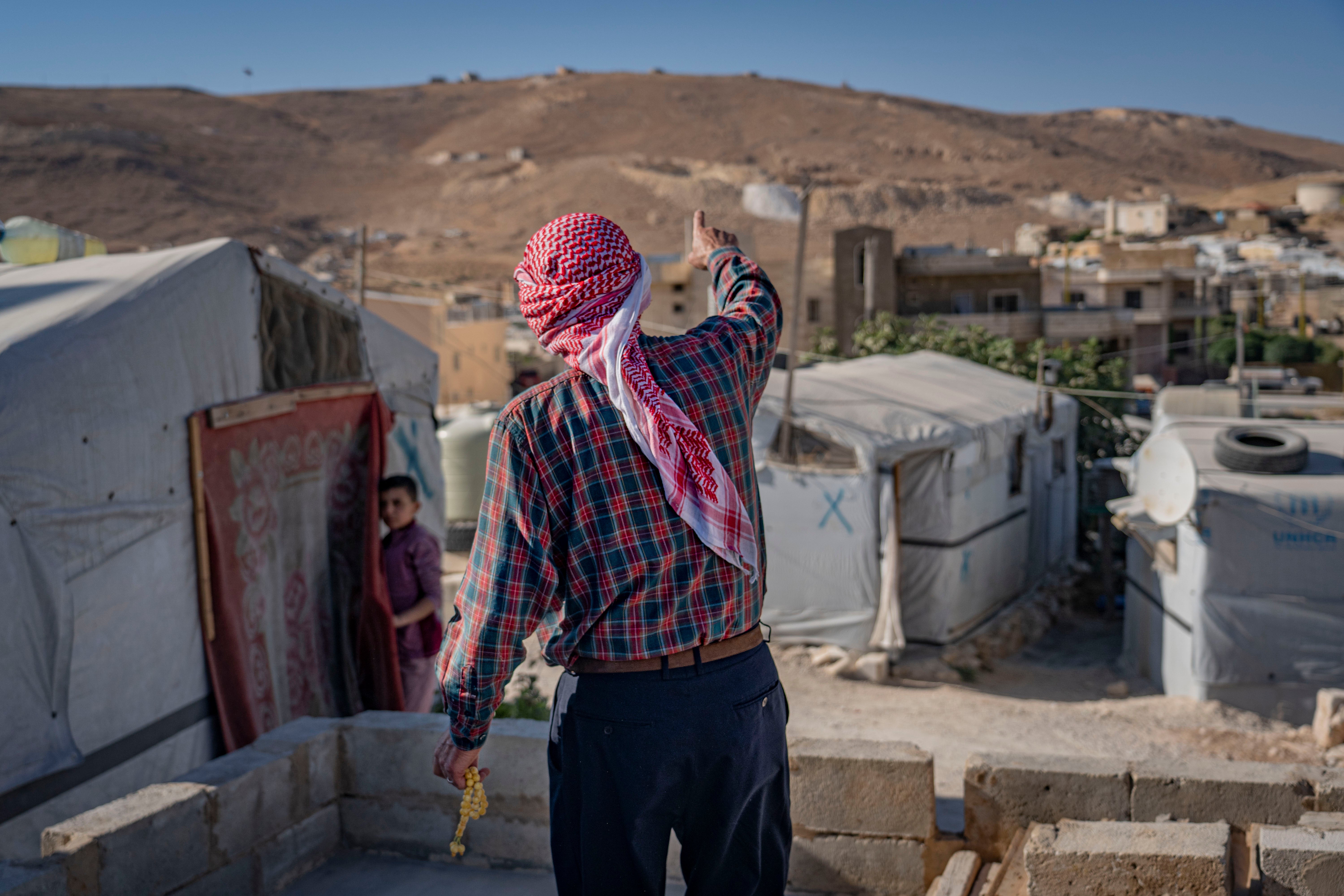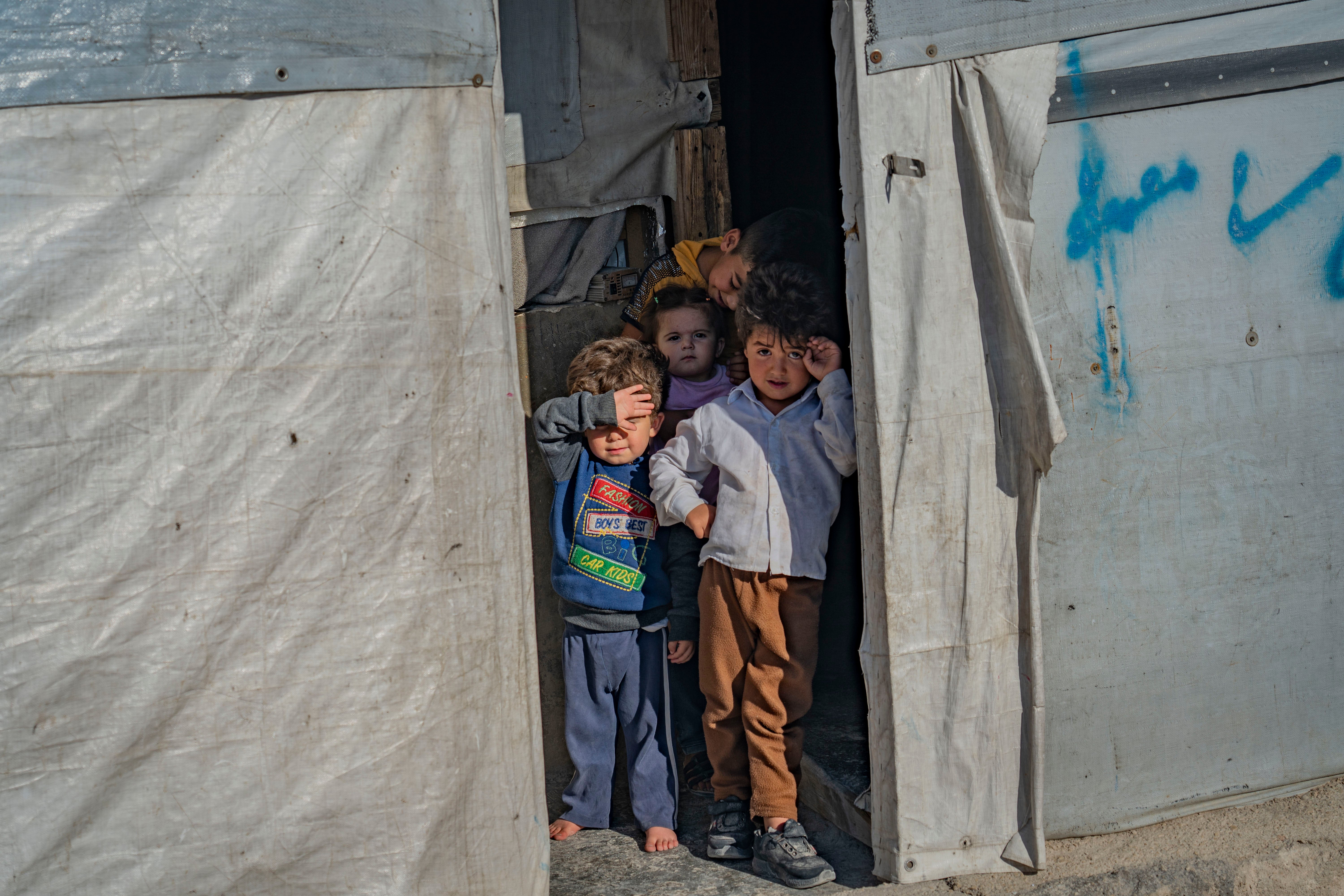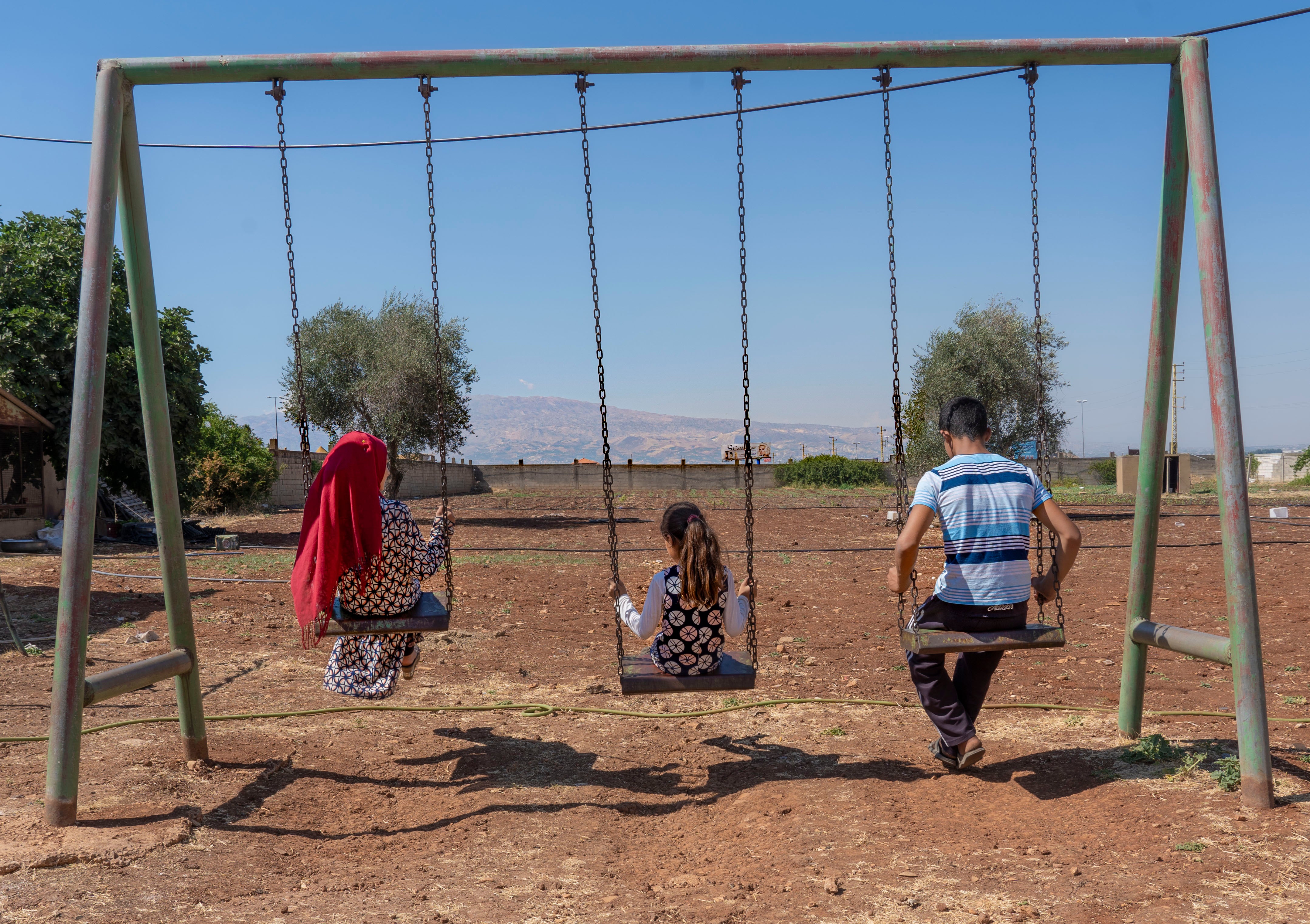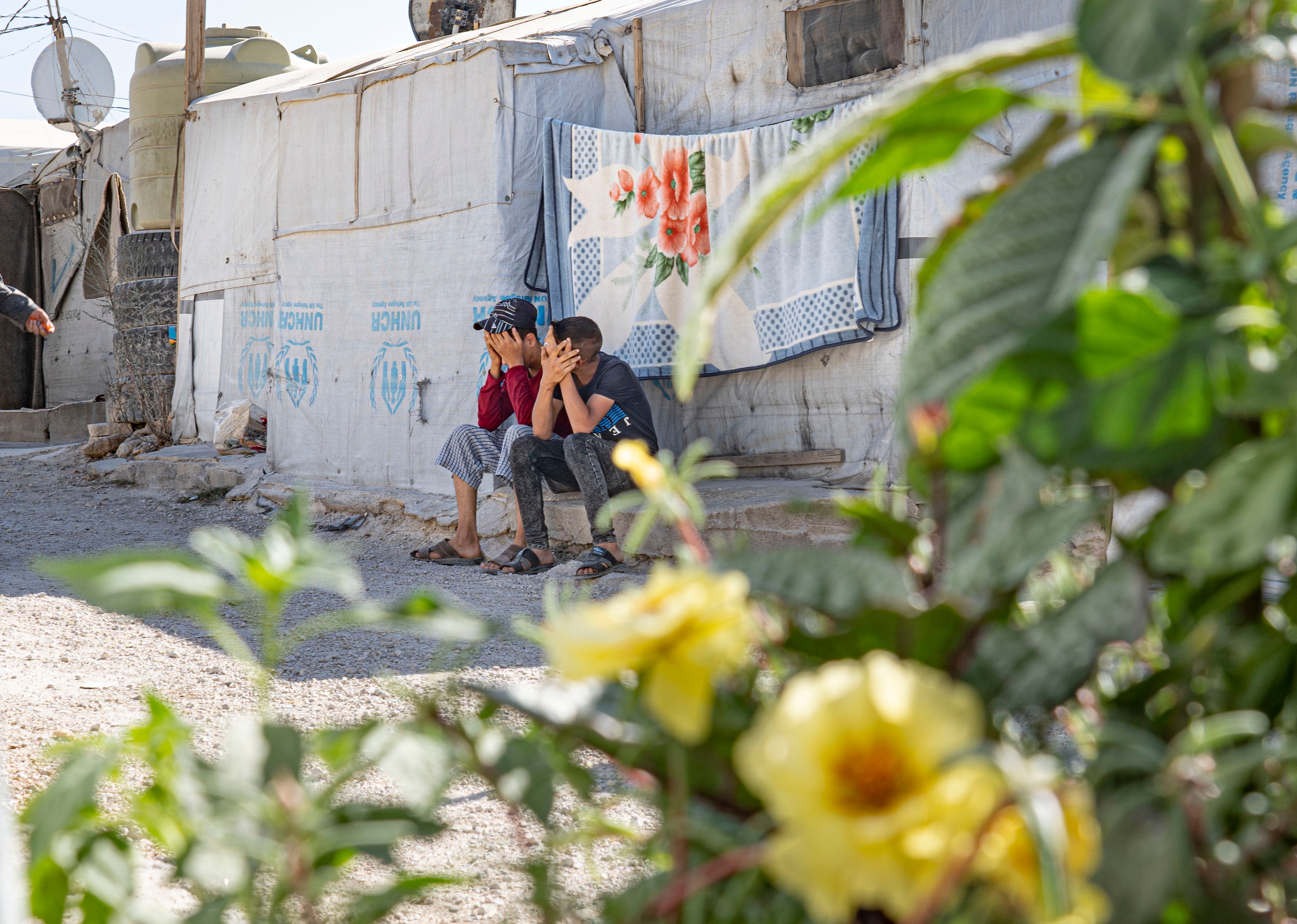They risked everything to flee war and hunger in Syria. Now, as Lebanon collapses, they plan to go back
Many Syrian refugees in Lebanon live in such poverty that some are making the seemingly unimaginable decision to return to their war-ravaged country, reports Middle East Correspondent Bel Trew


The father-of-four knows it is potential suicide to return home. But despite fleeing war just three years ago, he would rather risk death back in Syria than stay in Lebanon and starve.
Marooned by hunger and helplessness in a rundown neighbourhood in Beqaa Valley, Sultan, 46, describes how refugee families like his are on the frontline of Lebanon’s unprecedented economic collapse. The situation has become so severe, he says it is forcing them to make unimaginable decisions like sending their children back to an active war zone.
United Nations officials told The Independent that now “almost all” of the estimated 1 million Syrian refugees in Lebanon live under the extreme poverty line, which means surviving on just over a dollar a day. Ninety-nine per cent of Syrian refugees in Lebanon now do not have food or access to money to buy food.
For Sultan, he could not find aid, money, shelter or food for his wife and four children and so was forced to send them to his parents in the Damascus countryside, through the very smuggling routes they had used to escape.
But unable to find work and surviving on just a few discarded potatoes that he scavenges from a friend’s vegetable stand every day, he thinks that life in Syria might be marginally less hellish than Lebanon.
And so despite the risk of military conscription, arrest, or worse in Syria, where the war and a separate economic crisis also rages on, he is planning on joining them.
“I know it’s suicide to return but I don’t know what’s going to happen to me here. I swear two more weeks and I’ll have no food whatsoever,” the 44-year-old carpenter says, describing how he lives in a tiny room with three other Syrian men in a similar position.

Other families have done the same, he adds. He paid smugglers 800,000 lira (around £385 on the official rate or £30 on the black market rate) to send his family to Syria, which is considerably cheaper than the $1,000 (£725) it would cost to pay smugglers to try and sail to Cyprus, which is another increasingly popular route out.
“I’m choosing potential death in Syria over starving here because death is easier than hunger,” he adds with a weak smile.
“It’s not safe but it’s hell here and over there it’s hell. I might as well die in my hell.”
The total number of returnees is not known. The United Nations refugee agency UNHCR told The Independent that since 2016 they have documented more than 68,000 refugees returning to Syria, although the true number is expected to be far higher as many cross illegally and cannot be easily counted.
Lebanon was once a comparatively prosperous safe haven for hundreds of thousands of refugees – many of whom live in informal tented settlements and rented homes in areas like Beqaa, and Arsal, further north.
But it has become a living hell since a burgeoning economic crisis, anchored in decades of chronic mismanagement and corruption, has taken hold. Lebanon’s currency has lost over 95 per cent of its value, prices of some foodstuffs have quintupled in the last few months alone, the country is bankrupt and now suffering from crippling shortages of fuel and power.
The arrival of the coronavirus pandemic last year accelerated the tailspin, as did a massive blast at Beirut port in August, killing 200 people and destroying swathes of the capital.
Since then the delivery of millions of dollars of international aid and an International Monetary Fund Loan were promised but made dependent on the formation of a new government and reforms, which haven’t happened.
The World Bank now says that Lebanon is among the top three worst economic collapses the world has seen in the last 150 years. Ensnared in the eye of that storm are the people.
More than three-quarters of the 6 million people who live in Lebanon do not have food or money to buy food, according to the United Nations.
A packet of bread has gone up five times in the last few months to a prohibitive 4000 lira or £2 on the official rate. While the price of sugar, according to the refugees, has risen eightfold in a year.
And so it is not uncommon to see refugees and Lebanese rummaging through bins for food.
Syrian refugee families The Independent spoke to said that as it is now summer they had sold all their blankets to pay for food, and fear the coming winter.
Others spoke of swapping clothes and furniture for baby milk, nappies and medicines.
Child marriage and labour is soaring. In one Syrian refugee camp in Arsal, 120km (74.5 miles) northeast of Beirut, one Syrian refugee admitted that she had to marry off two of her daughters aged just 15 and 16 because she couldn’t afford to feed them.
“In 2019 about half of the refugee population in Lebanon were living under the extreme poverty line. At the end of 2020 that rose towards 90 percent but today, almost all of them are living in extreme poverty,” Ayaki Ito, UNHCR’s representative in Lebanon told The Independent.
“Of course the Lebanese population has been hit by this economic meltdown but the refugee population has been hit hardest.”
Today, almost all Syrian refugees in Lebanon are living in extreme poverty
It is harder to deliver aid to refugees if both populations are suffering. UNHCR currently pays refugees 400,000 lira per month in cash assistance to help them survive.
On the current black market rate this is £12 a month, and just a third of the monthly cost of the “Survival Minimum expenditure baskets” (covering the basic needs of a family) which in June UNHCR calculated to be over 1 million lira.
But giving more money to refugees, or paying them directly in dollars, could raise the spectre of serious social unrest as the Lebanese population receive a lot less.
The minimum wage in Lebanon is still a pitiful 675,000 lira a month (which is around £20 on the current black market rate).
“As poverty levels among Lebanese are increasing so are the tensions due to competition of scarce resources. This is a concern for everybody,” Mr Ito continued.
Nearly all of the two dozen refugees The Independent interviewed said that they had faced mounting hostility from the host population which was fast becoming another factor in wanting to return home.
One Syrian imam and refugee told The Independent his daughter and son-in-law were beaten up in December in a vicious attack because they were Syrian, which was the final straw for him. Despite the dangers, he is now seeking ways to return to Syria.
“The overwhelming feeling is people want to go back, the only thing holding them back is fear of what will happen to them on the other side,” added the cleric, who asked not to be named.
In Arsal, north of Bekaa, one refugee called Abu Abdu, 65, said he was so determined to return to Syria he had already packed up his tent, ready to take with him to re-erect in his village because his house had been destroyed in the fighting.
At least two other families The Independent interviewed were also doing the same.

Abu Abdu said shortages of money, food, fuel, and the mounting hostility towards refugees were not the only reasons for leaving – there were also fears Lebanon could completely disintegrate.
“The situation in Lebanon is going to explode,” the father-of-10 said standing on the concrete base of the encampment, next to a pile of wooden beams and tarpaulin that once constituted his shelter.
“When you put these kinds of problems and pressures on any people they can only explode. My country was once just like Lebanon is now.”
The humanitarian crisis in Syria is in many ways worse than Lebanon's. UN officials and experts warn that in Syria inflation is over 150 per cent and the currency has lost 99 per cent of its value since the start of the war.
Elizabeth Tsurkov said that milk products, meat, and olive oil were completely unaffordable in Syria and people were relying heavily on barely edible subsidised bread.
Whole swathes of the country are still in rubble because of the fighting, areas have no electricity at all, and fuel is also scarce. People meanwhile are earning as little as $15 (£11) a month, she adds.

“I think we are heading for a famine in both countries,” Ms Tsurkov tells The Independent.
Returnees are also at great risk of being swallowed up in the terrifying arbitrariness of the Assad regime whose officials often suspects citizens who fled opposition areas.
“The reasons why refugees fled Syria have not changed,” warns Nadia Hardman, Human Rights Watch’s refugee researcher.
“The regime is still deeply entrenched, their tactics are still to arbitrarily detain, target, and disappear people that are in opposition or perceived to be in opposition,” she said.
Ms Hardman adds that poverty and hunger stalked Syrians on both sides of the border.
“We know of Syrian returnees who have been able to survive and so have made their way back to Lebanon again,” she added.
It’s not safe but it’s hell here and over there it’s hell. I might as well die in my hell
But that is still not deterring Sultan, who knows if he does go home he is at grave risk of detention because he worked as a janitor in a hospital on the rebel side before he fled the fighting, and some of his colleagues have been tortured and detained.
“What can I do? I cannot feed myself or house myself anymore?’ he asks in despair.
In Arsal, Abu Abdu echoed Sultan’s grim conclusion, but says that in Lebanon he does not have even the “smallest things for survival”.
“If I get hungry I will be hungry in my country, I will work in my land, I will work in my house,” he says, running his hands through prayer beads as he looks out over the mountains.





Join our commenting forum
Join thought-provoking conversations, follow other Independent readers and see their replies
Comments